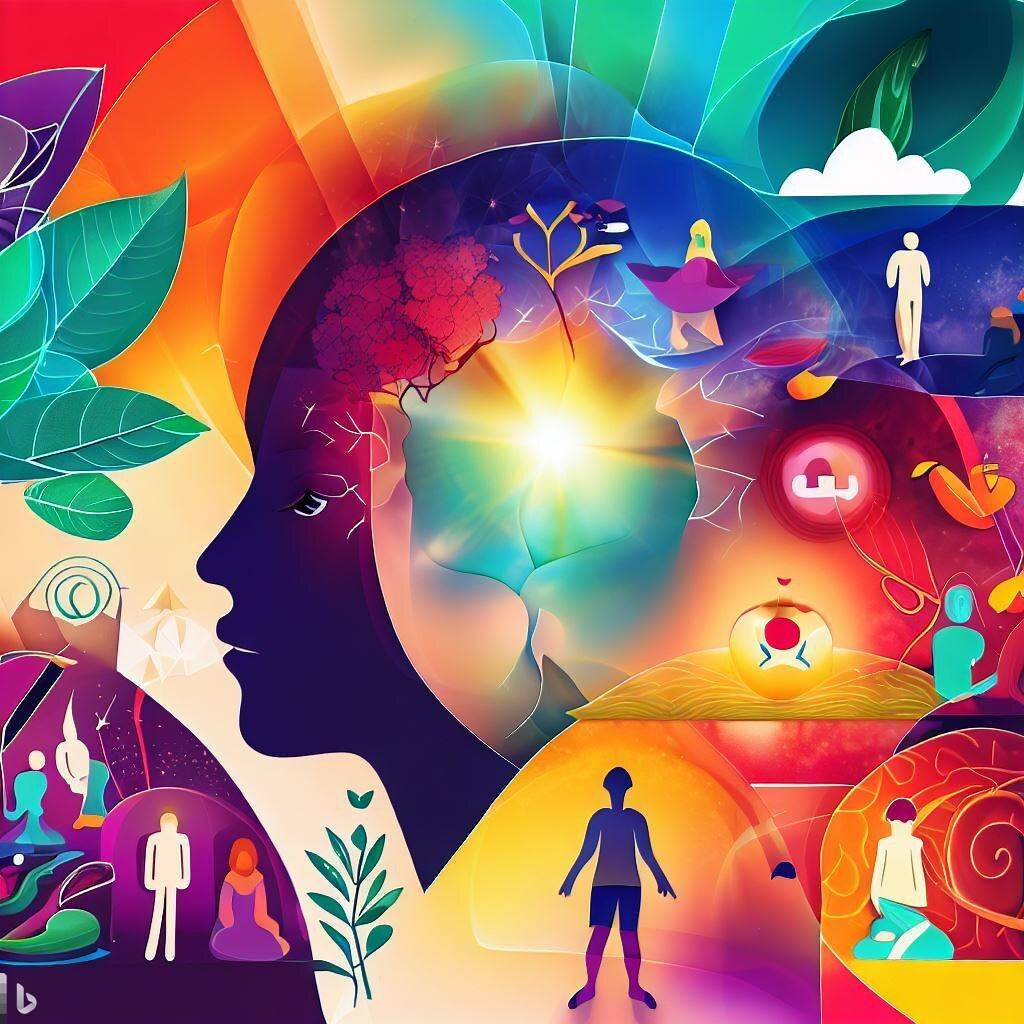Introduction:
In today’s fast-paced and demanding world, prioritizing mental health and well-being is of utmost importance. Mental health affects people of all ages, from young adults navigating their way through college to working professionals striving for a healthy work-life balance. It influences parents and caregivers as they support their families, and older adults seeking fulfillment in their golden years. Even students and educators can benefit greatly from understanding and promoting mental wellness in educational settings.
This comprehensive guide aims to shed light on the significance of mental health and provide practical strategies for individuals of all ages to enhance their well-being. Whether you’re a young adult juggling academic and personal responsibilities, a working professional coping with stress, a parent nurturing a supportive home environment, an older adult seeking a fulfilling retirement, or a student or educator striving for optimal learning and teaching experiences, this guide has something valuable to offer you.
Table of Contents
Section 1: Understanding Mental Health and Well-being

In order to embark on a journey towards better mental health and well-being, it is crucial to have a clear understanding of what these concepts entail. Let’s begin by defining mental health and exploring the various dimensions of well-being.
1.1 Defining Mental Health
Mental health encompasses a person’s emotional, psychological, and social well-being. It affects how individuals think, feel, and act, ultimately influencing their ability to handle stress, build relationships, and make choices. Mental health is not just the absence of mental illness but also the presence of positive mental well-being.
1.2 Exploring Well-being
Well-being is a holistic concept that encompasses various aspects of an individual’s life. It goes beyond the absence of illness and encompasses physical, emotional, social, and spiritual well-being. When these dimensions are in balance, individuals experience a sense of fulfillment, happiness, and overall satisfaction with their lives.
Section 2: The Importance of Mental Health for Different Age Groups

2.1 Young Adults and College Students
The transition from adolescence to young adulthood can be both exciting and challenging. Young adults face numerous changes, such as leaving home, pursuing higher education, establishing independence, and navigating new relationships. It is during this period that mental health support and self-care practices become crucial. This section will delve into common mental health issues faced by young adults and provide strategies to promote well-being.
2.2 Working Professionals
The modern workplace often comes with high expectations, intense competition, and significant workloads. The pressure to perform can take a toll on the mental health of working professionals. Balancing career demands with personal life can be challenging, leading to stress, burnout, and other mental health issues. In this section, we will explore effective coping mechanisms, work-life balance strategies, and ways to prioritize mental health in a professional setting.
2.3 Parents and Caregivers
Parenting is a rewarding yet demanding role that requires significant emotional and mental energy. Parents and caregivers play a crucial role in shaping the mental health and well-being of their children. However, it is essential for parents to prioritize their own mental health to ensure they can provide the best support. This section will address the unique challenges faced by parents and caregivers and provide practical tips for self-care, managing stress, and fostering a positive family environment.
2.4 Older Adults and Seniors
The golden years can bring about various life changes, including retirement, health concerns, and adapting to an empty nest. Mental health issues such as loneliness, depression, and anxiety can arise during this phase of life. It is vital for older adults and seniors to maintain their mental well-being and find fulfillment in their newfound freedom. This section will discuss the importance of social connections, engaging in meaningful activities, and seeking support in promoting mental health among older adults.
2.5 Students and Educators
Educational settings can significantly impact mental health, both for students and educators. Students face academic pressures, social challenges, and transitions, while educators experience the demands of teaching, curriculum planning, and supporting student well-being. This section will explore strategies for stress management, fostering positive learning environments, and creating a culture of mental well-being within educational institutions.
Section 3: Strategies for Enhancing Mental Health and Well-being

3.1 Prioritizing Self-Care
Self-care is a fundamental aspect of mental health and well-being. It involves engaging in activities that promote relaxation, self-reflection, and rejuvenation. This section will provide practical self-care ideas for individuals of all ages, emphasizing the importance of self-compassion and making time for activities that bring joy and fulfillment.
3.2 Building Resilience
Resilience plays a vital role in navigating life’s challenges and maintaining mental well-being. This section will explore strategies for building resilience, including developing a positive mindset, seeking support networks, and practicing adaptive coping mechanisms. Readers will gain insights into how resilience can help them bounce back from setbacks and thrive in the face of adversity.
3.3 Nurturing Relationships and Social Connections
Human connection and social support are crucial for mental health and well-being. This section will highlight the importance of healthy relationships and provide tips for fostering meaningful connections with family, friends, and the community. It will also address strategies for managing conflicts, setting boundaries, and seeking help when needed.
3.4 Practicing Mindfulness and Stress Reduction Techniques
Mindfulness and stress reduction techniques can significantly contribute to mental well-being. This section will introduce readers to the concept of mindfulness and provide practical exercises for incorporating mindfulness into daily life. It will also explore various stress reduction techniques such as deep breathing, meditation, and relaxation exercises, empowering individuals to manage stress effectively.
3.5 Seeking Professional Help
In some cases, professional help may be necessary to address mental health concerns. This section will discuss the importance of seeking professional support, such as therapy or counseling, and provide guidance on how to find appropriate mental health professionals. It will also address any stigmas associated with seeking help and emphasize the benefits of professional intervention.
Section 4: Promoting Mental Health in Different Environments
4.1 Schools and Educational Institutions
Educational environments play a critical role in promoting mental health among students and educators. This section will explore strategies for creating mentally healthy schools, including implementing comprehensive mental health programs, providing access to support services, and fostering a positive and inclusive school culture.
4.2 Workplace Settings
Employers have a responsibility to prioritize employee well-being and create mentally healthy workplaces. This section will address the role of employers in supporting mental health, including implementing policies for work-life balance, promoting open communication, and providing resources for mental health support. It will also offer tips for employees to take care of their mental health within the workplace.
4.3 Community and Social Support
Communities can have a significant impact on the mental health and well-being of individuals. This section will explore the importance of community support networks, social engagement, and access to resources. It will provide suggestions for individuals to get involved in their communities, seek support from local organizations, and contribute to the mental well-being of others.
Conclusion:
Prioritizing mental health and well-being is essential for individuals of all ages. By understanding the importance of mental health, implementing strategies for self-care, seeking support when needed, and promoting mental well-being in various environments, we can all strive towards leading healthier, happier lives. Remember, no matter your age or circumstances, taking care of your mental health is a valuable investment in yourself and your overall well-being.
Useful Resources
Remember, these are general answers, and individual circumstances may vary. If you have specific concerns or questions about your mental health, it is always advisable to consult with a qualified mental health professional.
National Alliance on Mental Illness (NAMI)
NAMI is a reputable organization that provides education, support, and advocacy for individuals and families affected by mental illness. Their website offers a wealth of resources, including information on different mental health conditions, treatment options, and support programs.
Mental Health America (MHA)
MHA is a leading nonprofit organization dedicated to promoting mental health and well-being. Their website provides educational materials, screening tools, and resources for individuals seeking support or looking to learn more about mental health topics.
Substance Abuse and Mental Health Services Administration (SAMHSA)
SAMHSA is a U.S. government agency that focuses on behavioral health issues, including mental health and substance abuse. Their website offers resources, treatment locators, and information on prevention, recovery, and support services.
Crisis Text Line
Crisis Text Line provides free, confidential 24/7 support via text message. It is a valuable resource for individuals in crisis or those who need immediate emotional support. The website offers information on how to access their services and engage in a text conversation with a trained crisis counselor.
Headspace
Headspace is a popular meditation and mindfulness app that offers guided meditations, sleep support, and other resources for improving mental well-being. Their website provides information about their app and how to get started with a meditation practice.
Frequently Asked Questions (FAQs)
What is the difference between mental health and mental illness?
Mental health refers to a person’s overall emotional, psychological, and social well-being. It encompasses positive mental well-being and the ability to cope with life’s challenges. On the other hand, mental illness refers to specific diagnosable conditions that affect a person’s thoughts, emotions, and behaviors. While mental illness is a part of mental health, not all individuals with mental health concerns have a diagnosed mental illness.
How can I take care of my mental health on a daily basis?
Taking care of your mental health involves practicing self-care activities regularly. This includes prioritizing rest and relaxation, engaging in activities you enjoy, maintaining a healthy lifestyle through exercise and balanced nutrition, and nurturing healthy relationships. It is also crucial to recognize and address stressors and seek support when needed.
When should I seek professional help for my mental health concerns?
If you are experiencing persistent or worsening mental health symptoms that significantly impact your daily functioning and quality of life, it is advisable to seek professional help. Additionally, if you have thoughts of self-harm or suicide, it is crucial to reach out to a mental health professional or a helpline immediately. They can provide appropriate support and guide you through the necessary steps.
Are there any natural remedies or alternative therapies that can support mental health?
While self-care activities and alternative therapies can contribute to mental well-being, it is essential to consult with a healthcare professional to ensure their safety and effectiveness. Alternative therapies such as mindfulness, meditation, yoga, and herbal supplements may complement traditional treatments but should not replace professional guidance.
How can I support a loved one who is struggling with their mental health?
Supporting a loved one with mental health challenges involves being understanding, compassionate, and non-judgmental. Listen to their concerns, encourage them to seek professional help, and offer assistance in finding appropriate resources. Respect their boundaries, educate yourself about their condition, and remind them that they are not alone.
If you have any queries or you want to get in touch with us for any other reasons feel free to Contact Us.

[…] into your weight loss journey, set realistic and attainable goals. Focus on improving your overall health and well-being rather than just chasing numbers on a scale. Aim to lose a few pounds each week and celebrate every […]
[…] activities, such as reading, hobbies, or spending time with loved ones. Taking care of your mental well-being is essential for a successful weight loss […]
[…] support individuals facing emotional challenges. EmoCare’s AI chatbot provides empathetic and non-judgmental conversations, offering therapeutic support and connecting users with mental health […]
[…] requirements is obtaining a business license. In this article, we’ll provide you with a comprehensive guide on whether you need a business license to sell on Etsy, the factors that determine if you need one, […]
[…] MindCareAI is leveraging AI to transform mental healthcare by offering personalized and accessible support. Through chatbots and virtual therapists, MindCareAI provides timely assistance, reducing the stigma around mental health and improving overall well-being. […]
[…] can give a more sophisticated and mature appearance. Choosing the right nail colors can help you enhance or downplay your age as […]
[…] application of AI in mental health offers transformative possibilities for behavioral healthcare. AI-driven mental health apps can […]
[…] diseases have reached epidemic proportions worldwide, affecting millions of people across various age groups. The World Health Organization (WHO) estimates that chronic diseases are responsible for […]
[…] Self-care is vital for maintaining physical and mental well-being. […]
[…] Chronic stress can sabotage your weight loss goals and hinder detoxification. Implement stress-reducing practices in your daily routine, such as meditation, deep breathing exercises, spending time in nature, or engaging in hobbies you enjoy. Managing stress not only aids in weight loss but also contributes to improved mental clarity and emotional well-being. […]
[…] A: No, healthy fats found in foods like avocados, nuts, and olive oil are essential for heart health and overall well-being. […]
[…] organizations and policymakers focus on early intervention, chronic disease management, and health promotion, the need for healthcare professionals who can provide primary care, preventive services, and […]